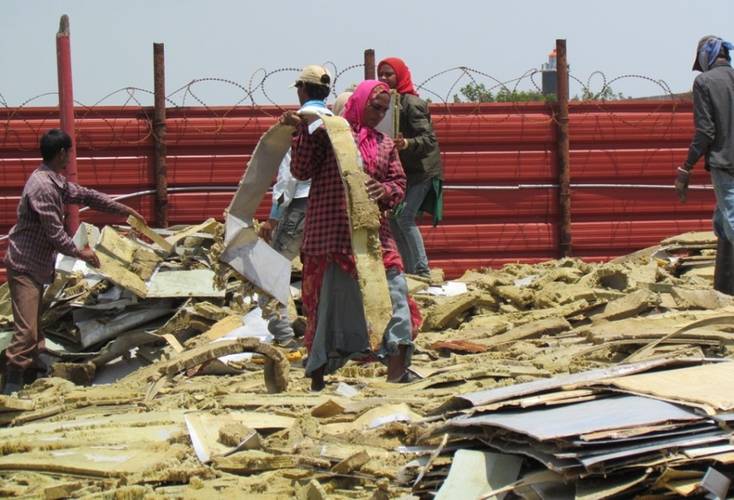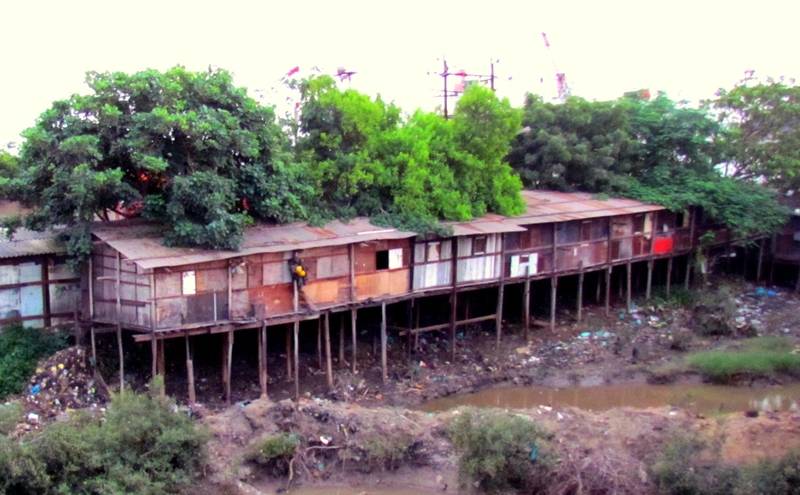Report by Indian research institute reveals poor enforcement of occupational health and safety provisions
The working and living conditions at the shipbreaking yards of Alang, India, remain alarmingly poor, argues a new study published in the Economic & Political Weekly, an Indian Social Science journal. The research was commissioned and financed by the National Human Rights Commission of India (NHRC) and was coordinated by Dr. Geetanjoy Sahu from the Tata Institute of Social Sciences (TISS). TISS’ findings are based on field work in Alang from April 2013 to May 2014 including interviews with 300 shipbreaking workers as well as stakeholders from the industry, trade unions and authorities.
The study finds that the “costs to workers’ health and the environment are alarming” while the profit margins for both the yard owners and the contractors providing the labor force are extremely high. Dr Sahu reports that the approximately 35,000 unorganized migrant workers at Alang continue to live in shanty dwellings without adequate facilities for drinking water, sanitation and electricity. The authorities have set up only 12 showers and six toilets. As a result, “workers are forced to defecate in the open.”
Official figures accessed by TISS report at least 470 fatal accidents in the yards since they were first set up in 1983, making shipbreaking one of the most dangerous occupations in India. Indian human rights advocates referred to in the report estimate however that there is a far higher number of victims, especially because the long-term consequence of unsafe shipbreaking activities, including occupational diseases such as cancer, and resulting deaths are not taken into consideration by the authorities. The report refers to the National Institute of Occupational Health, which had found out that 15 out of 94 examined workers showed signs of diseases caused by exposure to asbestos.
“It is scandalous that no shipbreaking company has been held responsible for the deaths and accidents at the yards,” said Patrizia Heidegger, Executive Director of the NGO Shipbreaking Platform. “Shipbreakers do get arrested and even charged for homicide, but the industry, in particular the Ship Recycling Industries Association (SRIA) is, as the report points out, well connected and has so far succeeded in avoiding being held liable for their negligence.”
Around 100 workers are treated every day at the local Red Cross hospital. They show a very high rate of injuries resulting from work at the yards, and a high prevalence of occupational diseases. According to the report, the Red Cross hospital is understaffed and lacks the necessary facilities to treat serious injuries where lives are at stake.
“The lack of adequate healthcare facilities in Alang is nothing new,” Heidegger said, “an Inter-Ministerial Committee has been raising the issue since 2005 – with no result. This situation is miserable.”
A 100-bed hospital is constructed by the Employee’s State Insurances Company for all industries employing more than 25,000 workers. As many workers in Alang are not officially registered by the employers – only around 16,000 currently, i.e. less than half of the workforce – the Alang shipbreaking yards do not benefit from the scheme. There is also a lack of educational facilities for the migrant workers’ children.
The research team found that workers are not provided with adequate safety training and protective equipment such as masks, gloves and boots. Workers revealed that in most cases personal protective equipment was only distributed before audits and official visits, such as by the National Human Rights Commission.
In addition to serious health and safety risks, the researchers documented delays in the payments of wages, unauthorized deductions, unpaid leave and overtime payments not in line with legal requirements. TISS also points out the absence of an active and strong trade union representing the interests of migrant workers. Though the Alang-Sosiya Ship Recycling and General Workers’ Association formed in 2006 seeks to support the workers, it is confined to individual support rather than collective rights. Many workers shared their fear of losing their jobs if they were to protest against their working and living conditions. What makes the situation more difficult is that many of the local village leaders benefit from the industry, for instance by renting out shacks to workers or selling them drinking water. Thus, the migrant workers also find little support amongst local leaders.
The report highlights that law enforcement by the various central and state government agencies that are involved in the regulatory control of the industry remains weak. The Gujarat Maritime Board (GMB), the nodal agency, has been very permissive regarding violation of rules and regulations by shipbreaking yards. Responsible agencies, such as the Directorate of Industrial Safety and Health, have been found understaffed and the Inter-Ministerial Committees reduced to symbolic meetings not taken seriously by the Ministry of Steel (which was until recently the focal ministry for the shipbreaking sector) “as every meeting ends in assurances by the SRIA and implementing agencies to resolve water, sanitation, housing safety, and hospital issues, but nothing significant has so far been done in this direction”. Dr Sahu points out that this has to be understood in the larger context of “lopsided development at the cost of human rights and the environment” under the so-called ‘Gujarat model’ of development, introduced by the current Prime Minister Narendra Modi during his tenure as the Chief Minister of the state.
“We share the conclusion of the report arguing that there cannot be any further delays in ensuring better working and living conditions”, comments Heidegger. “The situation is alarming and the report is a clear call to Indian authorities. But the report’s findings also reveal the misleading efforts of especially SRIA when they claim that Indian shipbreaking yards are ‘green’ recycling facilities operating in accordance with international standards. It is clear that without compliance with basic rights including housing, sanitation, drinking water, health facilities, fair wages and adequate safety provisions, the Alang yards are still far from ensuring sustainable ship recycling.”
















